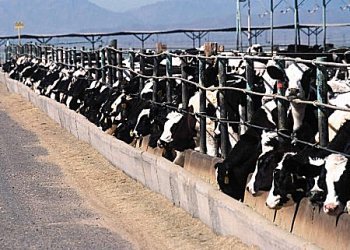Today, a great majority of people recognize that the destructive factory farming industry seriously harms the environment while regulatory bodies struggle to contain the mounting damage. Perhaps people take for granted that safety measures, so vital to prosperity and posterity, are maintained at a satisfactory level. Transportation and fuel industries are well known for their opposition to regulatory precautions in the face of record profits and steadily rising use in developing nations. Yet, for all the environmental destruction that most certainly occurs from fuel and transportation, the most noxious industry is one that operates under our collective radar, isolated from our cognitive daily routine. Indeed, it is not a stretch to describe factory farming as the most harmful American industry, one that does the greatest amount of damage to the environment and our spiritual well-being.
In Cowed: The Hidden Impact of 93 Million Cows on America's Health, Economy, Political, Culture, and Environment, authors Denis Hayes and Gail Boyer Hayes write that producing a single pound of beef has the same climate change potential as burning a gallon of gasoline. In an interview with the National Geographic, Hayes and Hayes say that:
That pound of beef grown on a confined animal feeding lot and fed grain is grown in huge tracts in the Midwest. If you throw in the amount of energy that is used in making the nitrogen fertilizer deposited on the cornfields; all the gasoline that goes into the tractors that plow the fields and harvesters that harvest the grain; the gas used to transport the corn to the feeding lots where the cows are slaughtered and refrigerated and moved off into the market; the gas people use in their two-ton SUVs to go down to the grocery store and buy the beef, bring it home and refrigerate it some more, and then cook it--by the time you've gone through all of that, the amount of carbon dioxide that is given off per pound of beef is, in fact, greater [than burning a gallon of gasoline].
Consider these facts courtesy of DoSomething.org:
1.About 10 billion animals in the United States are raised for their dairy, meat and eggs each year.
2.Factory farming accounts for 37 percent of methane emissions. Methane has over twenty times the global warming potential than carbon dioxide.
3.The Environmental Protection Agency (EPA) estimates that confined animals generate thee times the raw waste than humans in the United States alone.
4.This animal waste is often over-applied, which causes unsafe levels of phosphorus and nitrogen to seep into the water supply. In these excessive amounts, nitrogen robs water of oxygen and destroys aquatic life.
5.Burning fossil fuels to produce fertilizers for feed crops can emit 41 million metric tons of carbon dioxide per year. An additional 90 million metric tons of carbon dioxide per year may be emitted by fossil fuels used for intensive confinement operations.
6.Globally, deforestation for animal grazing lands and feed crops is estimated to emit 2.4 billion tons of carbon dioxide each year.
7.The staple crops corn, wheat, and rice, are among the most nitrogen-hungry of all plants. The demand for these crops by developing and industrialized nations is more than nature can naturally provide.
8.On most factory farms, animals are crowded into relatively small areas, their waste material funneled into massive lagoons. These pools often break, leak, or overflow, sending nitrate pollution and drug-resistant bacteria into the fresh water supply.
9.Factory farms contribute to air pollution by releasing a deadly concoction of hydrogen sulfide, ammonia, and methane.
10.The Department of Agriculture estimates that confined farm animals generate more than 450 million tonnes of manure annually, three times more raw waste than generated by people in America.
Rebbe Nachman of Breslov taught that since the world was created for human beings (Sanhedrin 37b), each person should reflect on how he or she can improve it (Likkutei Moharan 5:1). The world is for me in that I (and therefore you) have been chosen with a great responsibility. If I acknowledge that "the world was created for me" then I acknowledge that that is true for all others as well. My service is to affirm this truth for all people. Following Kant's Universal Imperative, I must live how I want all others to live. My role in the world is for me to be a model living by universal moral imperatives to the best of my ability. I am not merely a robotic instructor of moral truths, but an explicator, and one who strives to do the best I humanly can to create meaningful action. "The world was created for me" doesn't imply the world is instrumental. Far from it! The world has holiness and it was created be used not instrumentally, but constructively. It is created for me which means I must honor, protect, and enhance that sacred creation.
If the world was created for me, then I must take responsibility to ensure that the world can continue to be created for many generations to come. There are deep questions that humanity faces as we reach a precipice of no return. How are we to mediate climate change? How can I reduce my meat intake? How can I raise awareness about the harms of the factory farming industry? What is my role in ensuring a justice course of action? Now is the time to act as the hour of irreversibility is getting late.
Rabbi Dr. Shmuly Yanklowitz is the Executive Director of the Valley Beit Midrash, the Founder & President of Uri L'Tzedek, the Founder and CEO of The Shamayim V'Aretz Institute and the author of seven books on Jewish ethics. Newsweek named Rav Shmuly one of the top 50 rabbis in America."
